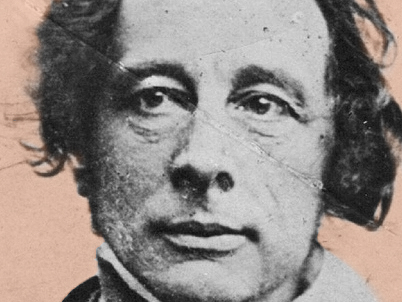
Charles Dickens, upon reading George Eliot’s first published work Scenes of Clerical Life, wrote Eliot a letter expressing his profound admiration for the work, as well as some doubts as to her male pseudonym: “I have observed what seem to me to be such womanly touches, in those moving fictions,” he writes, “that the assurance on the title-page is insufficient to satisfy me, even now. If they originated with no woman, I believe that no man ever before had the art of making himself, mentally, so like a woman, since the world began…”
TO GEORGE ELIOT
January 18, 1858, London
My Dear Sir
I have been so strongly affected by the two first tales in the book you have had the kindness to send me through Messrs. Blackwood [Eliot’s publisher], that I hope you will excuse my writing to you to express my admiration of their extraordinary merit. The exquisite truth and delicacy, both of the humour and the pathos of those stories, I have never seen the like of; and they have impressed me in a manner that I should find it very difficult to describe to you, if I had the impertinence to try.
In addressing these few words of thankfulness, to the creator of the sad fortunes of Mr. Amos Barton, and the sad love-story of Mr. Gilfil, I am (I presume) bound to adopt the name that it pleases that excellent writer to assume. I can suggest no better one; but I should have been strongly disposed, if I had been left to my own devices, to address the said writer as a woman. I have observed what seem to me to be such womanly touches, in those moving fictions, that the assurance on the title-page is insufficient to satisfy me, even now. If they originated with no woman, I believe that no man ever before had the art of making himself, mentally, so like a woman, since the world began.
You will not suppose that I have any vulgar wish to fathom your secret. I mention the point as one of great interest to me—not of mere curiosity. If it should ever suit your convenience and inclination, to shew me the face of the man or woman who has written so charmingly, it will be a very memorable occasion to me. If otherwise, I shall always hold that impalpable personage in loving attachment and respect, and shall yield myself up to all future utterances from the same source, with a perfect confidence in their making me wiser and better.
Your obliged and faithful Servant, and admirer
CHARLES DICKENS.
+


